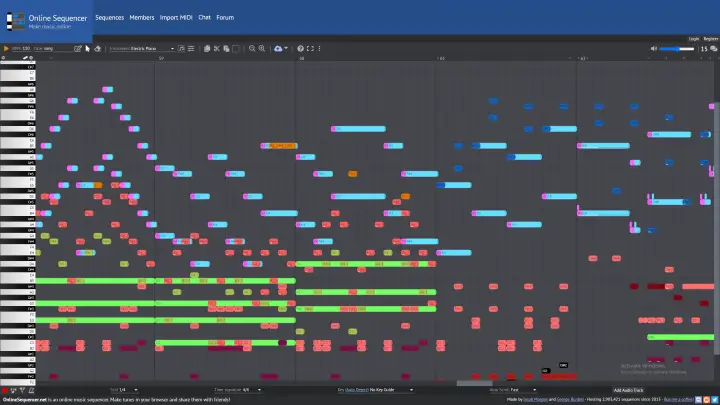Online Sequencer: Difference between revisions
(→Features: Removed some features and added main article) |
m (→Basic features: Added Page:Autoscroll link) |
||
| Line 28: | Line 28: | ||
*Time signature (2/4, 3/4, 4/4, 5/4) | *Time signature (2/4, 3/4, 4/4, 5/4) | ||
*Grid size (This correlates to note divisions; 1/16, 1/12, 1/8, 1/6, 1/4, 1/3, 1/2) | *Grid size (This correlates to note divisions; 1/16, 1/12, 1/8, 1/6, 1/4, 1/3, 1/2) | ||
* | *[[Autoscroll]] (Fast, Smooth, Off; how the sequencer displays measures off-screen as a sequence plays) | ||
*Add an Audio Track (This won't be saved to the sequence but will play alongside it for ease of transcription) | *Add an Audio Track (This won't be saved to the sequence but will play alongside it for ease of transcription) | ||
*Title input | *Title input | ||
Revision as of 20:55, 28 September 2023
Online Sequencer is a web-based music sequencer that allows users to create music saved online, or on their computer. The piano roll is essential to the sequencer, which is on the left of the screen, with 72 notes from C2-B7 (labelled differently from a piano, C2 on the sequencer corresponds to C1 on a piano). In addition to several parameters which can be modified to change the sound of the music, additional functionality can be accessed via the console.
Upon opening the site, users can begin composing and "drawing" notes on the grid, with the default instrument being Electric Piano. By default, a sequence's time signature is set to 4/4, and the grid spacing is set to 1/4 (16 notes per measure). The note lengths can be adjusted by dragging the dark tab on the right of each note, and precision can be afforded by changing the 'Grid' option to other note divisions.
Overview
Online Sequencer is most particularly known for its unique sequencer style. It has 54 unique instruments with 7 instrument categories. The sequencer contains 5 total octaves spanning from C2 to B7. It includes basic tools and settings such as the BPM tool, Edit, Select, and Erase tool, and more.
History
Online Sequencer was created on January 2, 2013 by Jacob Morgan during a break at Georgia Tech.
Beginning in the fall of 2013, accounts were available but were separate from the music portion of the site. They were only used in the forum and the website chat.
In 2015, accounts were linked to the main website and allowed songs to be saved under someone's username.
The World Update in 2018 added several new instruments and changed the landscape of sound design on the site. The "World Update Contest" was held for the update.
Starting in late 2020, OS began to receive a variety of updates which vastly improved the functionality of the site. These updates introduced features like custom grid sizes, automation with markers, extra reverb options, detune, and distortion. In 2021, the "Space Race" contest was held, as to see who could work best with the changes.
In late 2022, newer, higher-quality instruments were added. Some of the instruments, such as Electric Piano, Grand Piano, Violin, and Cello got an updated sustained version, while the original versions still exist under the "classic" designation.
In early 2023, 10-Year Anniversary Contest was held to celebrate 10 years of Online Sequencer with user Bentoonie winning.
Features
Main Article: Features
Within the editor, numerous user interface features allow for various changes which will impact the individual sequence on that page.
Basic features
UI features include:
- Tempo (10-999 BPM)
- Measure count or Time count (MM: SS.ssss)
- Time signature (2/4, 3/4, 4/4, 5/4)
- Grid size (This correlates to note divisions; 1/16, 1/12, 1/8, 1/6, 1/4, 1/3, 1/2)
- Autoscroll (Fast, Smooth, Off; how the sequencer displays measures off-screen as a sequence plays)
- Add an Audio Track (This won't be saved to the sequence but will play alongside it for ease of transcription)
- Title input
- Draw, select, and erase
- Instrument dropdown, instrument options, and select instrument (selects all notes of the current instrument)
- Select all, Cut, Copy, and Paste
- Zoom options
- Export options
- Help
- Fullscreen
- Tooltips
- More Tools
- Import MIDI
- Fast Graphics
- Invert
- Minor - Major
- Reverse Selection
- Humanize Selection
- Fade in Selection
- Fade out Selection
- Stretch Selection
Browser and device support
Online Sequencer supports Chrome and other Chromium-based browsers, such as Microsoft Edge, Opera, and Brave. Firefox is also supported, but often with limited functionality. Safari and Internet Explorer are not supported, due to engine issues.
Other mobile browsers support sequence playback, but not editing. However, iOS users have the same problem with WebKit on macOS. However, unlike in macOS, all browsers (even Chromium-based browsers) use WebKit as the engine for iOS due to Apple prohibiting other engines for security reasons; iOS does not support Online Sequencer, other than chat and forums. However, as Google goes to test Chrome on Blink for iOS, these conditions may be dropped eventually, despite, as of September 2023, the iOS web browser's rules on WebKit.
The website's user interface is formatted for proper use on desktops, but some pages such as the chat page, playlists, and forums should be formatted well on mobile devices.
